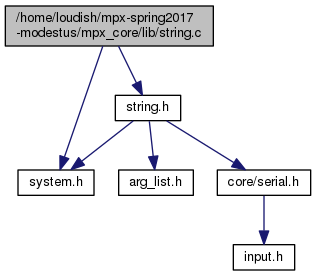|
Modestus Moon OS
R4
CS 450 project
|
|
Modestus Moon OS
R4
CS 450 project
|

Go to the source code of this file.
Functions | |
| int | strlen (const char *s) |
| strlen returns the length of a string More... | |
| char * | strcpy (char *s1, const char *s2) |
| strcpy copies one string to another string More... | |
| int | atoi (const char *s) |
| atoi converts and ASCII string to an integer More... | |
| int | strcmp (const char *s1, const char *s2) |
| strcmp compares two strings. More... | |
| char * | strcat (char *s1, const char *s2) |
| strcat concatenates the contents of one string onto another. More... | |
| int | isspace (const char *c) |
| isspace Determines if a character is a whitespace. More... | |
| void * | memset (void *s, int c, size_t n) |
| memset Set a region of memory. More... | |
| char * | strtok (char *s1, const char *s2) |
| strtok Split string into tokens. More... | |
| int | sprintf (char *str, int bufLength, const char *format,...) |
| sprintf print with format to specified string buffer More... | |
| int | intToS (const int *const i, char *buf, int bufLength) |
| intToS converts a signed integer to string More... | |
| char | is_conversion_specifier (char c) |
| is_conversion_specifier checks to see if the character is one of the standard printf formats More... | |
| int | isnum (const char c) |
| isnum inline helper function to check if a character is represents an ascii number More... | |
| int atoi | ( | const char * | s | ) |
atoi converts and ASCII string to an integer
| s | const char *s, character pointer to a string. |
Definition at line 46 of file string.c.
Referenced by createPCB(), setDate(), setPriority(), setTime(), and sprintf().
| int intToS | ( | const int *const | i, |
| char * | buf, | ||
| int | bufLength | ||
| ) |
intToS converts a signed integer to string
| i | integer to convert |
| buf | buf to place the converted string |
| bufLength | length of the buffer, string writing will not exceed this value |
Definition at line 317 of file string.c.
References strlen().
Referenced by sprintf().
| char is_conversion_specifier | ( | char | c | ) |
|
inline |
| int isspace | ( | const char * | c | ) |
isspace Determines if a character is a whitespace.
| c | character to check. |
| void* memset | ( | void * | s, |
| int | c, | ||
| size_t | n | ||
| ) |
memset Set a region of memory.
| s | destination. |
| c | byte to write. |
| n | count. |
Definition at line 139 of file string.c.
Referenced by init_idt(), init_paging(), kmain(), and loadr3().
| int sprintf | ( | char * | str, |
| int | bufLength, | ||
| const char * | format, | ||
| ... | |||
| ) |
sprintf print with format to specified string buffer
| str | a char *, place where the built string will be placed |
| bufLength | the size of the buffer of the char *, string writing will not exceed this value |
| format | a format string confirming to the std library format |
| ... | any number of parameters that will be printed according to the format. if wrong type is specified, behavior is undefined |
Definition at line 229 of file string.c.
References arg_list, atoi(), init_arg_list, intToS(), is_conversion_specifier(), isnum(), strcpy(), and strlen().
| char* strcat | ( | char * | s1, |
| const char * | s2 | ||
| ) |
| int strcmp | ( | const char * | s1, |
| const char * | s2 | ||
| ) |
strcmp compares two strings.
| s1 | string 1 to compare. |
| s2 | string 2 to compare. |
Definition at line 77 of file string.c.
Referenced by date(), exec_comm(), helpDate(), helpFunc(), helpMCB(), helpPcb(), helpTime(), isEmpty(), mcbFunc(), pcbFunc(), pcbSearchFunc(), searchcompFunction(), shutdownFunc(), stringToClass(), and time().
| char* strcpy | ( | char * | s1, |
| const char * | s2 | ||
| ) |
strcpy copies one string to another string
| s1 | destination string. Character pointer to a string. |
| s2 | source string. Character pointer to a string. |
Definition at line 26 of file string.c.
Referenced by parse_comm(), serial_poll(), setupPCB(), and sprintf().
| int strlen | ( | const char * | s | ) |
strlen returns the length of a string
| s | character pointer to a string |
Definition at line 10 of file string.c.
Referenced by helpDate(), helpTime(), intToS(), setDate(), setTime(), setupPCB(), and sprintf().
| char* strtok | ( | char * | s1, |
| const char * | s2 | ||
| ) |
strtok Split string into tokens.
| s1 | String to split |
| s2 | Delimeter. |
Definition at line 154 of file string.c.
References NULL.
Referenced by parse_comm().